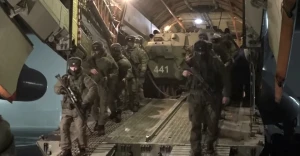
Russian propaganda's neo-Nazi claims about Ukraine: what's new in November?
The demonization of Ukraine and Ukrainians is a key part of Russia’s hybrid war against Europe. Such propaganda allows Russia to justify its aggression in Ukraine on the global stage
Espreso has analyzed Russian state media and pro-Kremlin outlets in Europe, identifying the most common negative narratives about Ukraine that were spread by them in November.
Today, we’ll discuss how Russian propaganda demonizes Ukrainians in the eyes of Western audiences. It typically uses various narratives for this, ranging from claims of neo-Nazis in Ukraine to accusations that Ukraine is attacking nuclear facilities in Russia.
It’s important to note that in this article, we’re not focused on debunking these lies. Most such fakes are recycled over and over, and even the most absurd ones have already been exposed by fact-checkers. Instead, this study looks at the network of Russian state media and pro-Kremlin outlets in Europe, highlighting the websites that spread this propaganda. Our goal is to put public pressure on European governments to take stronger action against the mouthpieces for the Kremlin in Europe.
Neo-Nazi junta in Ukraine
In November, the Canadian-based conspiracy website Centre for Research on Globalization published an article titled "Disaster for Ukraine Military as NATO Assets Fail Across Battlefield. 'Zelensky Now Wants Nukes'!!!". The author, Drago Bosnic, a well-known promoter of Russian propaganda, claims that Ukrainian forces (referred to as a "Neo-Nazi junta") are so "successful" on the battlefield that they now need nuclear weapons to fight the Kremlin.
- https://www.globalresearch.ca/disastrous-month-neo-nazi-junta-forces/5871457
In late October, the same Centre for Research on Globalization claimed that the U.S. invented the story about North Korean troops in Russia to justify its involvement in the war and suggest that American paratroopers are fighting in Ukraine. This is despite intelligence from multiple countries, not just the U.S., confirming the presence of North Korean soldiers in the Russian military.
In November, the pro-Kremlin German-language site Anti-spiegel.ru published an article titled "How the Ukrainian SBU recruits terrorists under the supervision of Western intelligence services." The main claim is that Ukraine openly admits to carrying out terrorist and murder attacks in Russia and that Western intelligence services are fully supporting these Ukrainian terrorists.
- https://anti-spiegel.ru/2024/wie-der-ukrainische-sbu-unter-aufsicht-westlicher-geheimdienste-terroristen-rekrutiert/
Anti-spiegel.ru antagonizes the well-known German magazine Der Spiegel. Its editor-in-chief, Thomas Röper, who has lived in Russia for 20 years, criticizes mainstream media and presents Anti-spiegel.ru as an alternative. The pro-Kremlin website spreads pro-Russian propaganda and conspiracy theories, pushing false claims about the Ukraine invasion, including that the Bucha massacre was staged, that the U.S. has biolabs in Ukraine, and that Poland might annex western Ukraine.
Another Czech manipulative website, Iportal24.cz, spread an article in November with narratives about neo-Nazis in Ukraine.
- https://www.iportal24.cz/nazory/ukrajina-mnoha-tvari/
Iportal24.cz often echoes Russian propaganda, claiming that Russia will win the war, that Western countries will be held responsible for their support of Ukraine, and that EU societies are unwilling to help Ukraine.
In November, the German-language website Okv-ev.de wrote that the German Chancellor uses the greeting of Ukrainian Nazis when speaking to Ukraine.
- https://okv-ev.de/2024/11/07/internationales-forum-von-jalta/
The website Okv-ev.de is part of a network spreading Russian propaganda and is affiliated with the Russian propagandist of German origin, Lianе Kilinс. It has previously spread fake news about Ukraine's First Lady, Olena Zelenska.
The blog Sicht-vom-hochblauen.de wrote in November that it was convenient for Washington and NATO to drive a wedge between Ukraine and Russia by using the neo-Nazi traditions of Stepan Bandera and other extreme Ukrainian nationalists who helped Nazi Germany invade Soviet Russia in 1941 as part of Operation Barbarossa. This is a typical Russian interpretation of World War II history.
- https://www.sicht-vom-hochblauen.de/warum-griffen-die-kiewer-streitkraefte-das-kloster-und-die-kathedrale-von-ugledar-an/
The blog Sicht-vom-hochblauen.de, run by German activist Evelyn Hecht-Galinski, often reposts content from pro-Russian propaganda websites.
Ukraine attacks nuclear facilities in Russia
A strong mouthpiece for the Kremlin in Europe is RT en Français, the French version of Russia’s state-run media RT. Despite efforts to block it, the website continues to spread Russia’s views and narratives to a French-speaking audience. In November, the site also repeated claims that Ukrainian forces were attacking the nuclear power plant in occupied Enerhodar. It's important to note that the Zaporizhzhia nuclear power plant has been under Russian occupation for a long time, and the IAEA has repeatedly confirmed that it is the presence of Russian troops at the plant that poses a global nuclear threat.
- https://francais.rt.com/russie/114578-forces-armees-ukrainiennes-ont-attaque-ukraine-russie-operation-speciale
Another Czech pro-Russian website, Infokuryr.cz, published an article in November spreading fake news, claiming that Ukraine is attacking nuclear facilities in Russia and will start a nuclear war before Trump’s inauguration.
- https://www.infokuryr.cz/n/2024/11/08/michael-svatos-kyjev-muze-pred-inauguraci-trumpa-rozpoutat-jadernou-valku-riziko-pry-roste-kazdym-dnem/
We’ve previously added Infokuryr.cz to our list of 20 Czech news websites that regularly quote Russian media and promote pro-Kremlin narratives.
Conclusions
Even though Russia has been spreading the fake story about neo-Nazis in Ukraine since 2014, it still helps their propaganda. Luckily, these fakes are not widely accepted in Europe. However, European governments haven't done enough to stop the spread of Russian narratives across the continent.
For more, check out our previous research on this topic from November.
In the first article of this research, we covered how Russian media and pro-Kremlin websites spread narratives about Russia's victories on the battlefield and the uselessness of supporting Ukraine.
In the second article, we analyzed the efforts of pro-Russian outlets in Europe to demonize the leadership of European Union member states and institutions, promoting narratives such as "EU leaders are leading their countries to ruin" and "The West is in decline, and a new world order with BRICS is coming."
In the third article, we outlined the pro-Kremlin media in EU countries and Canada and specifically how they spread the claim that “The West is to blame for the war in Ukraine,” with the primary objective of shifting responsibility for the war away from Russia.
- News











































